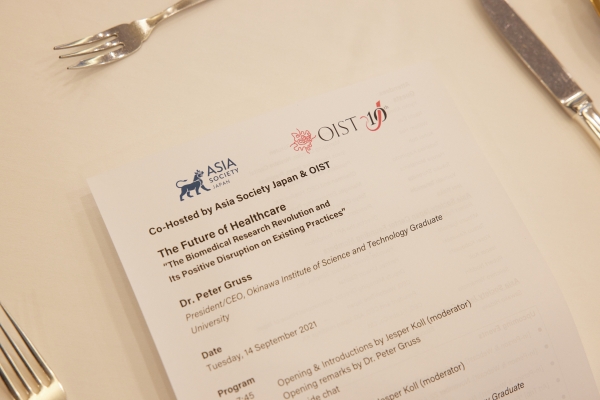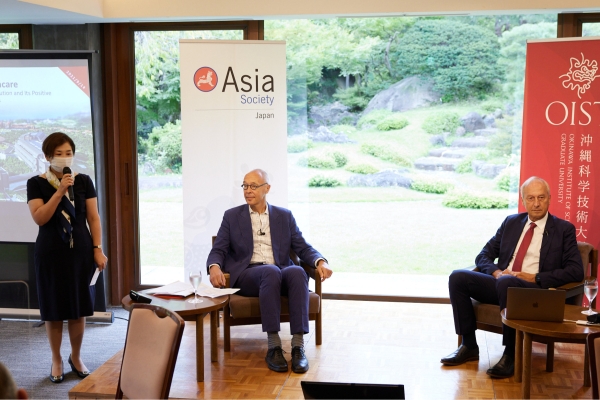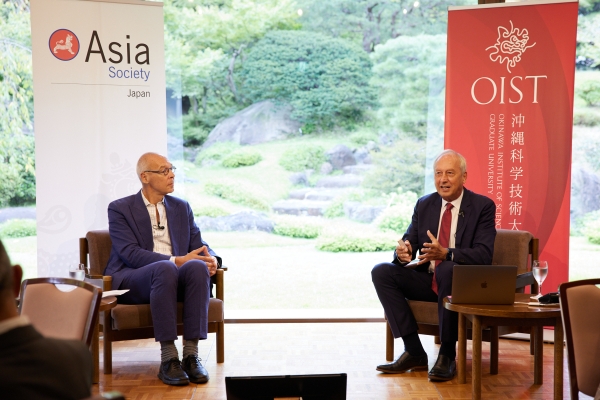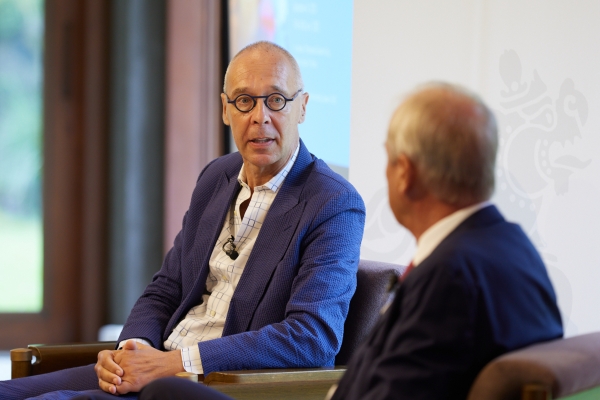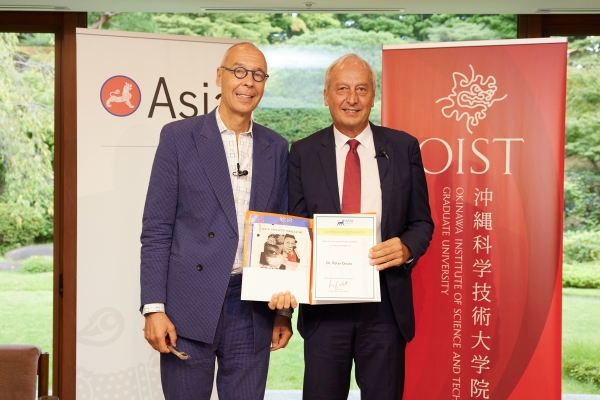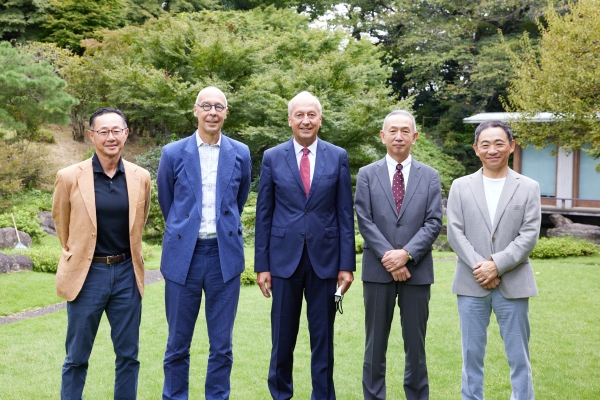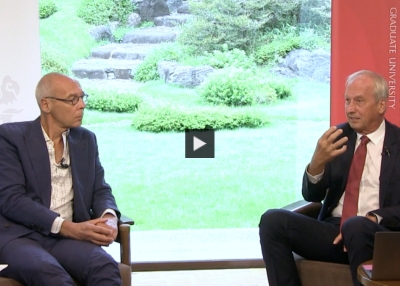The Future of Healthcare (Recap)
The Biomedical Research Revolution and Its Positive Disruption on Existing Practices
On September 14, 2021, Peter Gruss, President/CEO of Okinawa Institute of Science and Technology (OIST), presented his thoughts on the future of healthcare and engaged with participants on a topic that clearly has far-reaching implications for both our personal lives and public policy. Jesper Koll, chair of policy committee at Asia Society Japan, moderated the discussion.
One of the biggest human challenges is healthcare. Revolutionary technologies that have been developed over the past fifty years allow us to think about a health future in completely different terms.
The economic impact of increased life expectancy
The key challenges faced by biomedicine today are overpopulation and longer life expectancy. Population growth is leveling off at a high level, with a forecast of 11.2 billion people living on Earth in 2100. Less than half of the population will have to support more than half of the population in leading a sustainable life.
Ageing is associated with various diseases, including cancer. Today, 150 thousand people die each day around the globe, and 90% of those who die in industrialized nations die of age-related causes. This has a large economic impact, since nearly half of healthcare expenditures are used for the treatment of high age-related cardiovascular diseases, cancer, and respiratory diseases. A recent study has revealed that a slowdown in aging that increases life expectancy by one year is worth USD38 trillion.
Ageing is driven by the balance of damage and repair processes
Ageing results from the impact of the accumulation of a wide variety of molecular and cellular damages over time. While genetic aspects also account for a certain degree of how we age, much depends on how we live.
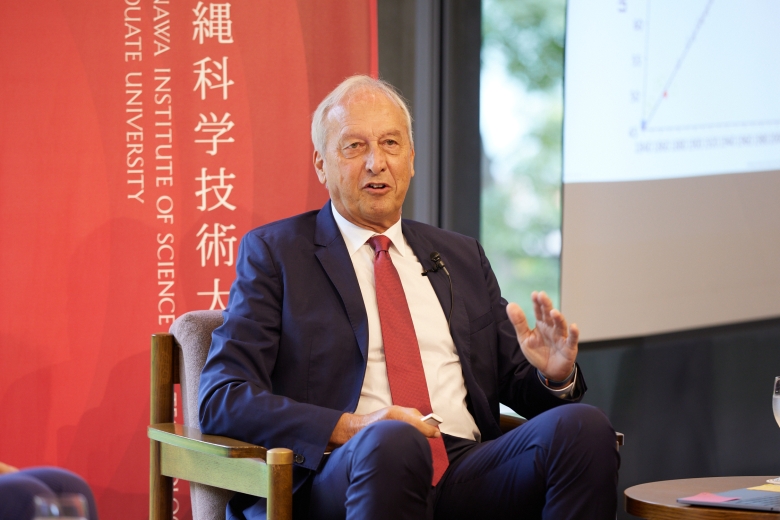
Some simple animals like the jellyfish are literally immortal. Hence, there are biological principles that overcome aging, allowing the full regeneration of entire organisms. There are many interspecies similarities that could be relevant to determining strategies as to how humans can age healthily.
One of the nine hallmarks of ageing is genomic instability, or the mutations that we get throughout our life from dietary habits, exposure to sunlight, etc. These factors interfere with our DNA sequence. Other hallmarks include telomerase reactivation and epigenetic alterations. Our constant interaction with the environment finds a place on our DNA so that genes are activated or inactivated.
The nine hallmarks are the nine targets of therapeutic interventions. This calls for clinical diagnosis, precision medicine, health monitoring and machine learning, a subdiscipline of AI that can transform these broad areas of biomedicine.
Emergence of precision medicine
One size does not fit all. Patients can respond differently to the same medicine. Hence, precision medicine, driven by advances in systems biology, supported by revolutionary technologies and IT/AI, is a promising approach. A patient’s genetic information and track response data can be used by physicians to create personalized treatment. A major tool is genome analysis. The cost of genome sequencing has dropped rapidly, making genome-based personalized treatment a feasible option for many – at least under USD1,000.
The convergence of patient data will create new ways of care delivery and paradigm change. Innovative companies combine genetic testing with AI to analyze data and compare results with patients worldwide to have physicians diagnose and treat diseases. Personalized, predictive, preventive, and participatory medicine will bring the shift from therapy to prediction and prevention, or sick-care to healthcare. The large numbers currently needed in clinical trials can be reduced because patients can be profiled based on their genome, and the group relevant to a particular treatment can be identified.
New business opportunities
A fully integrated digital healthcare ecosystem will be able to unlock the value of healthcare data and create new business opportunities. In the future, a set of simple intelligent devices will inform us, as we age, that our basic health parameters are working well. A constant feedback loop will tell the patient or doctor when things go wrong. Currently, here is a strong push to combine wearables technologies, which have yet to be introduced to the clinical world, with healthcare.
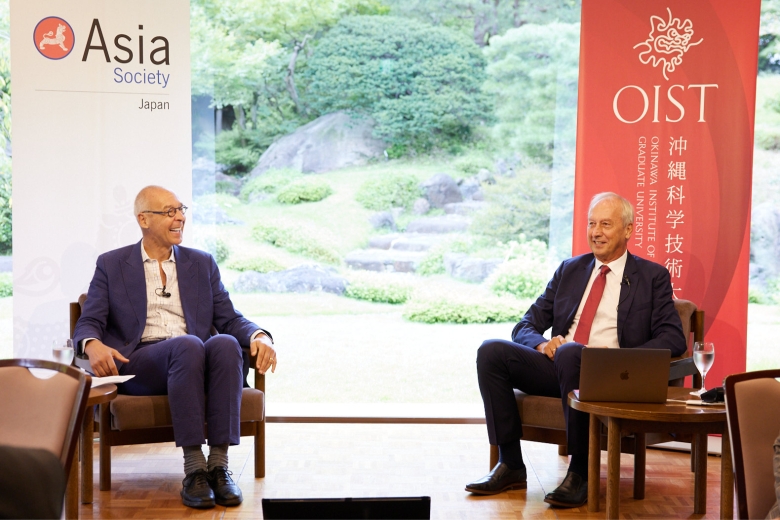
A holistic system approach is required to manage the future healthcare ecosystem and it is very likely that integrated technology and service provision will become a central element in the future.
Future research areas and ethical issues
Promising research areas include stem cell biology, organogenesis and regeneration. It is already possible to grow small organs in tissue culture. This helps us to understand certain defects. We can also take cells from patients and repair respective mutations in tissue culture. Yet, the world is not ready for some of these innovative technologies. A highly debated subject is the ethics of technologies such as Clustered Regularly Interspaced Short Palindromic Repeats (CRISPR) technology, which may allow for gene editing in single-cell embryos. While the Western science community is united in not addressing germline manipulation at this point of time, such technologies may be considered safe in the next ten to twenty years. However, short term success will come using somatic (body tissues) cells for therapeutic purposes. The Food and Drug Administration recently approved this therapy as a functional cure for chronic HIV infected patients.


